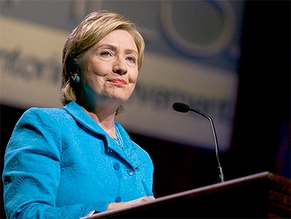|
World Jewish News

Hillary Rodham Clinton. Photo by esquire.com
|
Clinton: U.S. criticism will not stop
11.12.2010, Israel and the World The United States will criticize the sides in Israeli-Palestinian talks when they take unilateral actions, U.S. Secretary of State Hillary Rodham Clinton said.
That includes criticizing Israel when it plans building in eastern Jerusalem, she said.
"Unilateral efforts at the United Nations are not helpful and undermine trust," Clinton said last Friday night at the annual Saban Forum, referring to Palestinian efforts under way to secure U.N. recognition of a Palestinian state. "Provocative announcements on East Jerusalem are counterproductive. And the United States will not shy away from saying so."
Clinton''s remarks were her first on the matter since the United States announced on Dec. 6 that it was giving up its effort to convince Israel to extend a freeze on settlement building, effectively abandoning for now the prospect of direct Israeli-Palestinian talks. The Palestinian Authority had demanded an extension of the freeze as a condition for continuing direct talks.
The Obama administration offered Israeli Prime Minister Benjamin Netanyahu a package of security and diplomatic incentives to extend the freeze, but would not consider his request to effectively sanction building in eastern Jerusalem.
Clinton''s remarks signaled the Obama administration''s determination to continue making an issue of settlement building, a posture that has earned sharp criticism from Republicans, some Democrats and some in the mainstream pro-Israel community.
Clinton also offered the most pronounced U.S. endorsement of the Arab League Initiative, which proposes a blanket peace deal with all Arab countries in exchange for Israel''s proximate return to the 1967 borders.
"This landmark proposal rests on the basic bargain that peace between Israel and her neighbors will bring recognition and normalization from all the Arab states," she said. "It is time to advance this vision with actions, as well as words. And Israel should seize the opportunity presented by this initiative while it is still available."
Clinton''s wording, echoing claims by Arab leaders that the offer is time-sensitive and suggesting that it is Israel''s responsibility to "seize" it, goes beyond previous U.S. statements that have merely praised the initiative as one of several positive proposals.
Israeli leaders have said that elements of the initiative are positive, but balk at its implicit endorsement of a "right of return" for Palestinian refugees and their descendants, an element they say would set the stage for the end of Israel as a Jewish state.
Arab leaders have countered that the initiative is a starting point and that Israel should use it to present counter-proposals.
Also speaking at the Saban Forum, an annual get-together of Israeli and U.S. leaders sponsored by entertainment mogul Haim Saban through the Brookings Institution, were Israeli Defense Minister Ehud Barak and Palestinian Authority Prime Minister Salam Fayyad.
Barak, with opposition leader Tzipi Livni in attendance, called on Netanyahu to consider expanding his coalition beyond its right-wing partners, an unusual appeal to a foreign audience.
"In Israel we have to go beyond personal and partisan interests and egos, expand the Israeli government if needed, and brace ourselves for the immediate task of moving decisively forward," he said. "I believe that the coming few weeks can enable us to find the way to make it happen."
Barak also called for an "assertive" U.S. role in peace talks.
Fayyad''s speech was not open to media.
JTA
|
|
